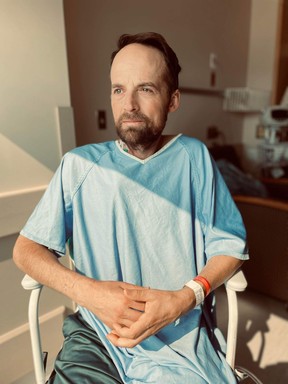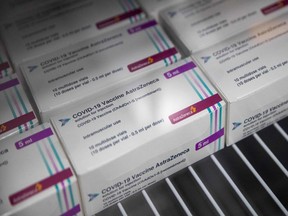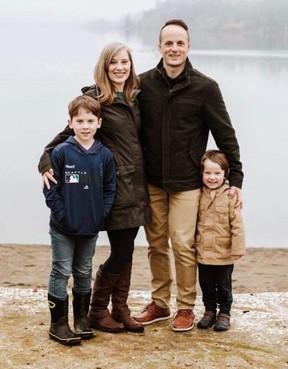This article is thanks to our friend in Northern Canada
Ross Wightman was diagnosed with Guillain-Barre Syndrome after receiving the AstraZeneca COVID-19 vaccine

Article content
Ross Wightman is one of the first people in Canada to be approved for compensation because of injuries sustained after receiving a COVID-19 vaccine.
Advertisement 2
The B.C. man was diagnosed with Guillain-Barré Syndrome (GBS), which left him partially paralyzed, after a first dose of the Oxford, AstraZeneca COVID-19 vaccine in April 2021.
He said his symptoms started with severe back pain 10 days after his shot. He went to the emergency room multiple times and was admitted on a Saturday when he reported facial tingling.
“By Tuesday, I had full facial paralysis. I could blink but I couldn’t smile or show my teeth at all, and had paralysis from the waist down as well,” Wightman told the National Post.
Wightman is now recovering at home after 67 days in the hospital. “I had quite a few ups and downs really early,” he said.

On May 20, 2022, Wightman posted a photo of a letter from the Canada Vaccine Injury Support Program (VISP) on his social media. The letter said the VISP had determined Wightman’s injuries were likely the result of the vaccine and he is eligible for compensation.
When they learned about the program last summer, Wightman said his wife Nicole sprung into action. The process was long, but getting the letter acknowledging the connection between the vaccine and his diagnosis, something he had already suspected, was vindicating, said Wightman.
Four hundred people have filed claims with the VISP since the program began in June 2021. Wightman is one of less than five people in Canada who have been approved to receive compensation for vaccine-related injuries, according to the VISP website data.
All VISP data is from November 30, 2021. Though VISP set a deadline to provide updated data by June 1, 2022 that update has not yet occurred.
The maximum lump-sum amount a person can receive through the VISP is $284,000. Though Wightman chose not to disclose the specific amount he was given for privacy reasons, he said he did not qualify for the maximum payout.
Approximately 85.5 million doses of COVID-19 vaccine have been administered in Canada since vaccines were first offered in December 2020. Health Canada continues to advise that “the benefits of all vaccines continue to outweigh the risks of the disease.”
Guillain-Barré Syndrome and COVID-19 Vaccines

GBS is an autoimmune condition in which the immune system starts attacking the peripheral nerves, mistaking them for a threat. This can lead to weakness, numbness, pain or, in cases like Wightman’s, partial paralysis.
According to the U.S. National Institute of Neurological Disorders and Stroke “most people eventually recover from even the most severe cases of GBS. After recovery, some people will continue to have some degree of weakness.”
Public Health Canada and research from University College of London in the United Kingdom both report no additional risk of GBS compared to general population rates after receiving either the Moderna or Pfizer-BioNTech vaccines. The AstraZeneca vaccine was associated with a small increase in GBS risk compared to the general population.
Still, the chances of developing GBS following any vaccine are rare. Government adverse effect data shows there have been 0.02 likely cases of GBS diagnosed for every 100,000 doses of vaccine administered, though that platform does not determine causal relationships.
GBS can also occur after COVID-19 infection, according to research from the Canadian Medical Association Journal.
On Nov. 11, 2021 the GBS Foundation of Canada released a statement saying it supported vaccination for all GBS patients, adding “we agree that the benefits of COVID-19 vaccination outweigh any theoretical risks of immunization,” though the release recommended mRNA vaccines such as Pfizer or Moderna.
The Road to Recovery

Wightman said his recovery process hasn’t been linear. He relapsed twice while in the hospital and was released after 67 days. “When I was discharged I could walk, assisted, 30, 40 feet and I would be gassed.”
Now, he says he “can now go for a slow 40-minute walk,” which he says he is grateful for, but as a typically active person, “it’s a far cry from where I was before.”
Wightman said support from parents, in-laws and siblings and the lake country community has been huge for him and his family in the last year.
Right now, Wightman says he’s learning to take things slow. “Going for a walk with my wife or a friend and just seeing the sights and sounds, those are probably my favourite things right now.”
Asked what he’s looking forward to getting back to, Wightman simply said “everything.”
He said he misses “running around on the lawn with my kids…just being able to chuck on my shoes and be out the door in a minute.”
B.C. man to receive compensation for vaccine injury one of the first in Canada | National Post


No comments:
Post a Comment